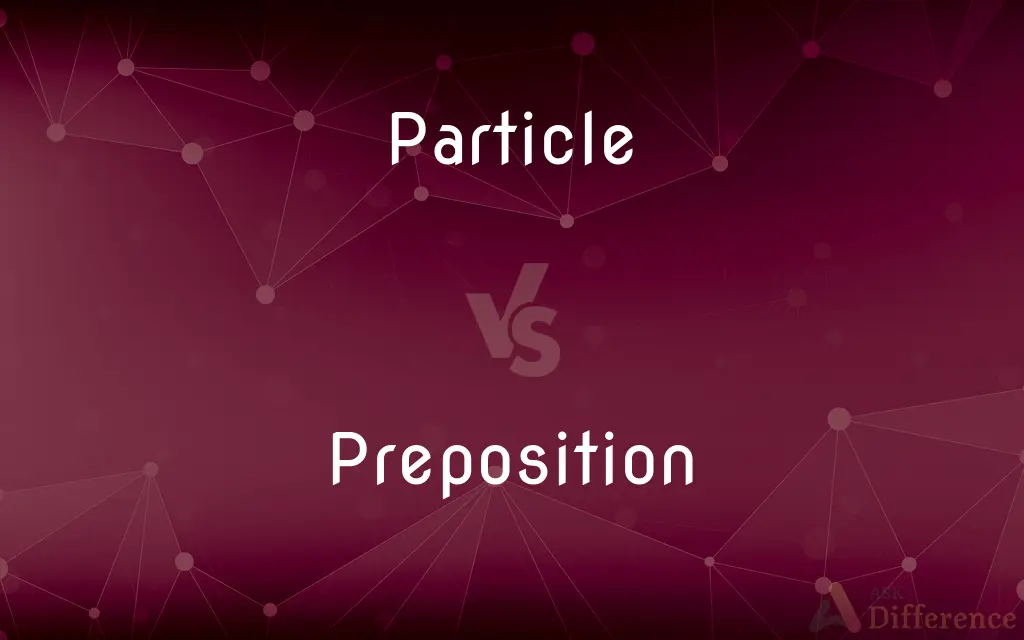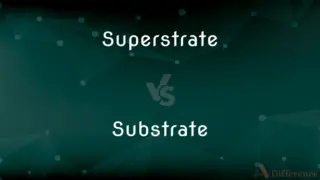Particle vs. Preposition — What's the Difference?
Edited by Tayyaba Rehman — By Maham Liaqat — Updated on April 1, 2024
Particles are invariable words that function within phrases to modify meanings, while prepositions are words that show relationships between other words in a sentence, often indicating location, direction, or time.

Difference Between Particle and Preposition
Table of Contents
ADVERTISEMENT
Key Differences
Particles are a grammatical category of words that do not change form and are used to alter the meaning of verbs, adjectives, or other adverbs. They are integral to phrasal verbs in English, where they can significantly change the verb's meaning (e.g., "give up" vs. "give"). Prepositions, however, are used to express relationships between nouns, pronouns, or phrases to other words within a sentence, typically indicating direction, location, time, or the method by which something is done.
The role of particles in a sentence is primarily to work with verbs to give a specific, often idiomatic meaning to the phrase. For example, in "look up" (to search for), "up" functions as a particle, not indicating direction but rather modifying the verb "look" to create a distinct meaning. Prepositions, like "in," "on," and "at," specify the positional or temporal relationship, such as in "on the table" or "at 3 PM," thereby giving context to the sentence's elements.
Particles are unique in that they do not serve a syntactic role on their own; their purpose is to modify or inflect the meaning of the phrases they are part of. In contrast, prepositions are crucial for constructing sentences by indicating how different parts of a sentence are related, which is fundamental for establishing the sentence's structure and meaning.
Understanding the difference between particles and prepositions is key to mastering phrasal verbs and sentence structure in English. While particles change the meaning of verbs without dictating any specific relational or positional information, prepositions establish a clear relationship or orientation between elements in a sentence, often related to space, time, or logical connection.
Despite their differences, both particles and prepositions are essential for expressing nuanced meanings and relationships in English. While particles can often be perplexing due to their role in phrasal verbs and their effect on meaning, prepositions require careful selection to accurately convey the intended spatial, temporal, or logical relations in a sentence.
ADVERTISEMENT
Comparison Chart
Definition
Invariable words that modify meanings within phrases.
Words that show relationships between other words in a sentence.
Function
Modify verbs, adjectives, or adverbs, often changing the meaning significantly.
Indicate location, direction, time, or method.
Examples
"Give up", "look after", "turn down".
"In the house", "on the table", "at 3 PM".
Role in a Sentence
Work with verbs to give specific meanings.
Specify positional or temporal relationships.
Key to Understanding
Essential for mastering phrasal verbs.
Crucial for constructing sentence structure.
Compare with Definitions
Particle
Integral to phrasal verbs.
Turn down the offer means to reject it.
Preposition
Expresses spatial, temporal, or logical relationships.
We walked to the park.
Particle
Do not change form.
In pick up, up remains unchanged regardless of tense.
Preposition
Can indicate various relationships.
He works under pressure.
Particle
Can significantly alter verb meaning.
Take off means to depart, not to remove something.
Preposition
Vital for clarity and precision in language.
I will meet you in July specifies when.
Particle
Lack a direct relational function.
In run out of, out modifies run to express depletion.
Preposition
Precedes nouns or pronouns to form phrases.
She is at home.
Particle
Not syntactically bound to a specific position.
Look it up or look up it in commands.
Preposition
Fixed in terms of the relationship they express.
On the table always indicates position.
Particle
In the physical sciences, a particle (or corpuscule in older texts) is a small localized object to which can be ascribed several physical or chemical properties, such as volume, density, or mass. They vary greatly in size or quantity, from subatomic particles like the electron, to microscopic particles like atoms and molecules, to macroscopic particles like powders and other granular materials.
Preposition
A word governing, and usually preceding, a noun or pronoun and expressing a relation to another word or element in the clause, as in ‘the man on the platform’, ‘she arrived after dinner’, ‘what did you do it for?’.
Particle
A very small piece or part; a tiny portion or speck.
Preposition
A word or phrase placed typically before a substantive and indicating the relation of that substantive to a verb, an adjective, or another substantive, as English at, by, with, from, and in regard to.
Particle
A very small or the smallest possible amount, trace, or degree
Not a particle of doubt.
Preposition
To position or place in position in advance
Artillery that was prepositioned at strategic points in the desert.
Particle
A body whose spatial extent and internal motion and structure, if any, are irrelevant in a specific problem.
Preposition
Any of a class of non-inflecting words typically employed to connect a following noun or a pronoun, in an adjectival or adverbial sense, with some other word: a particle used with a noun or pronoun (in English always in the objective case) to make a phrase limiting some other word.
Particle
See elementary particle.
Preposition
An adposition.
Particle
See subatomic particle.
Preposition
(obsolete) A proposition; an exposition; a discourse.
Particle
An uninflected item that has grammatical function but does not clearly belong to one of the major parts of speech, such as up in He looked up the word or to in English infinitives.
Preposition
To place in a location before some other event occurs.
It is important to preposition the material before turning on the machine.
Particle
In some systems of grammatical analysis, any of various short function words, including articles, prepositions, and conjunctions.
Preposition
A word employed to connect a noun or a pronoun, in an adjectival or adverbial sense, with some other word; a particle used with a noun or pronoun (in English always in the objective case) to make a phrase limiting some other word; - so called because usually placed before the word with which it is phrased; as, a bridge of iron; he comes from town; it is good for food; he escaped by running.
Particle
(Ecclesiastical) A portion or fragment of the Eucharistic host.
Preposition
A proposition; an exposition; a discourse.
He made a long preposition and oration.
Particle
(Archaic) A small part of something written, such as a clause of a document.
Preposition
A function word that combines with a noun or pronoun or noun phrase to form a prepositional phrase that can have an adverbial or adjectival relation to some other word
Particle
A very small piece of matter, a fragment; especially, the smallest possible part of something.
Preposition
(linguistics) the placing of one linguistic element before another (as placing a modifier before the word it modifies in a sentence or placing an affix before the base to which it is attached)
Particle
(physics) Any of various physical objects making up the constituent parts of an atom; an elementary particle or subatomic particle.
Particle
(linguistics) A part of speech that has no inherent lexical definition but must be associated with another word to impart meaning, often a grammatical category: for example, the English word to in a full infinitive phrase (to eat) or O in a vocative phrase (O Canada), or as a discourse marker (mmm).
Particle
(linguistics) A part of speech which cannot be inflected.
Particle
(Christianity) In the Roman Catholic church, a crumb of consecrated bread; also the smaller breads used in the communion of the laity.
Particle
A little bit.
Particle
A minute part or portion of matter; a morsel; a little bit; an atom; a jot; as, a particle of sand, of wood, of dust.
The small size of atoms which uniteTo make the smallest particle of light.
Particle
Any very small portion or part; the smallest portion; as, he has not a particle of patriotism or virtue.
The houses had not given their commissioners authority in the least particle to recede.
Particle
A crumb or little piece of consecrated host.
Particle
A subordinate word that is never inflected (a preposition, conjunction, interjection); or a word that can not be used except in compositions; as, ward in backward, ly in lovely.
Particle
An elementary particle.
Particle
(nontechnical usage) a tiny piece of anything
Particle
A body having finite mass and internal structure but negligible dimensions
Particle
A function word that can be used in English to form phrasal verbs
Common Curiosities
What role do prepositions play in sentence structure?
Prepositions are key to establishing the spatial, temporal, or logical orientation between different sentence elements.
Why are particles important in English?
Particles are crucial for understanding phrasal verbs and the idiomatic meanings they convey.
Do particles affect verb tense?
No, particles do not affect the tense of verbs; they modify the meaning irrespective of tense.
How does a preposition function?
A preposition shows the relationship between nouns, pronouns, or phrases to other words in a sentence, indicating direction, location, time, or method.
What is a particle in English grammar?
A particle is an invariable word that modifies the meaning of verbs, adjectives, or adverbs, often part of phrasal verbs.
Can the same word be both a particle and a preposition?
Yes, words like "up" can function as both, depending on their use in a sentence (e.g., "give up" vs. "up the hill").
What is the best way to learn particles and prepositions?
Practice and exposure to context-rich examples in reading and listening can significantly improve understanding and usage of both particles and prepositions.
Can prepositions be omitted in English?
While some languages may omit prepositions or use them differently, in English, prepositions are often necessary for clarity and meaning.
How can I distinguish between a particle and a preposition?
If the word modifies the verb to change its meaning and doesn’t indicate a clear relationship with another element, it’s likely a particle. If it establishes a relationship, it’s a preposition.
Are there fixed rules for preposition usage?
Preposition usage often follows specific patterns or rules, but exceptions and variations can occur, especially in idiomatic expressions.
Share Your Discovery

Previous Comparison
Adobe vs. Home
Next Comparison
Superstrate vs. SubstrateAuthor Spotlight
Written by
Maham LiaqatEdited by
Tayyaba RehmanTayyaba Rehman is a distinguished writer, currently serving as a primary contributor to askdifference.com. As a researcher in semantics and etymology, Tayyaba's passion for the complexity of languages and their distinctions has found a perfect home on the platform. Tayyaba delves into the intricacies of language, distinguishing between commonly confused words and phrases, thereby providing clarity for readers worldwide.














































